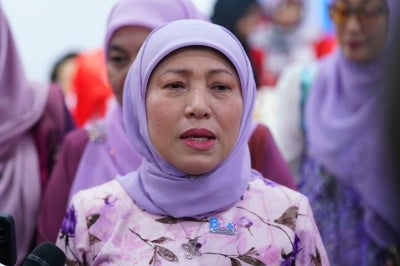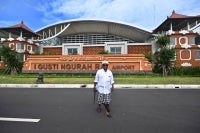Malaysia demands for access to Loss and Damage Fund, vital successful energy transition at COP28
USHAR DANIELE
DUBAI – The Malaysian government remains driven with their goals to access the Loss and Damage Fund as its energy transition plans will not be successful without funding.
Natural Resources, Environment and Climate Change Minister Nik Nazmi Nik Ahmad, in his keynote speech titled Advancing Just Energy Transition in Malaysia at the Malaysia Pavilion at COP28 on Monday said that financing should be given without it being doctrinaire, adding that they have to realise what was at stake - to ensure the continuity of the human race.
“We should be directed by the Common But Differentiated Responsibility and Respective Capability (CBDR-RC) which states that while all countries should tackle climate change, it is the wealthier ones that must help pay for it.
"Securing the funding needed will not happen if wealthier industrialised nations that have contributed most to global emissions and profited the most do not carry a heavier financial burden," he said.
In pursuant to the country’s goal to transition to clean and renewable energy, he said the government remains committed to ensuring that lower income and rural communities were included in the energy transition plans as energy transition cannot cater to only the urban and middle class with its National Energy Transition Roadmap.
Nik Nazmi said while Malaysia embraces energy transition, the cost of energy should not be socialised and those from lower income communities should not have to subsidise bills from higher income brackets.
“People who are living in the flats cannot be subsidising for bungalows that are in Shah Alam or Bangsar and I think that this is something that other countries have gone through so there was a political backlash,” he said, explaining that energy transition projects elsewhere have driven costs of energy up.
In addressing the rural communities, Nik Nazmi highlighted solutions such as grid solutions, mini hydro systems and solar panels was a workable solution and that the government was also looking at battery-power systems if the cost was within the budget.
However, when questioned about inclusivity of indigenous groups in the energy transition plans, Nik Nazmi said that while the NETR was rolled out with a focus on big energy but with regards to climate change, the government has included dialogues with civil societies.
“There is no problem for us to invite more civil societies to our consultative panel for them to sit and give their views so that when we talk about climate change, the conversation is truly inclusive," he added.
Nik Nazmi said Malaysia’s goal to achieve a net-zero future, the transition of the energy sector that was accountable for more than half of Malaysia’s overall greenhouse gas emissions will play a pivotal role.
“We believe that a progressive, robust, and well-developed renewable energy sector will move Malaysia forward which will open new green business and investment opportunities to the country to further expand our economic value and base," he said.
Nik Nazmi acknowledges that the heart of the transition lies in the acceleration of renewable energy capacity deployment and a robust low-carbon transition in tht power sector is fundamental to provide access to green energy, emphasising that a clean grid will be pivotal to shape a future marked by lower greenhouse gas emissions in electrification.
“We have to realise that winning over the public is a crucial part in the quest towards sustainability," he added.
To-date, the government has implemented various renewable energy initiatives including the Feed-in Tariff, Net Energy Metering Programme, Corporate Green Power Programme, and Green Electricity Tariff Programme in which Nik Nazmi dubbed it the ‘Green Gotong-Royong’.
These initiatives will continue to empower businesses to access green electricity.
Download Sinar Daily application.Click Here!














